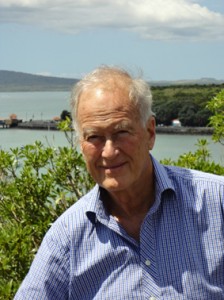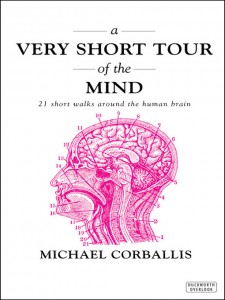A Very Short Tour of the Mind: 21 short walks around the human brain
By Michael C. Corballis
(Overlook Duckworth, 106 pages, $17.95)
The renowned essayist and teacher of literary nonfiction, Phillip Lopate of Columbia University, has said that the beauty of a personal essay is its “gift for candid, robust self-doubt.” While these 21 provocative, deliciously bite-sized hors d’oeuvres are not, strictly speaking, “personal essays,” they are personable and free of dogma, and leave you with an appetite for more.
“In these twenty-one short walks,” writes Michael C. Corballis, professor emeritus of psychology at the University of Auckland, in the opening essay entitled “Picking up the pieces,” “I have tried to convey something of the mosaic of the modern science of the mind…Many of them are adapted from pieces that were published in a column in New Zealand Geographic…” As a teacher of college essays, I especially admire their conciseness and clearly stated opinions. Corballis manages to strike an enviable balance between the conviction of an essayist and the skepticism of a scientist. He tells you what his thinks without evangelizing. He is a teacher not a preacher.
I was naturally drawn to Corballis’s thoughts on language, so allow me to tempt you with some morsels. In “Why Italians gesticulate,” Corballis rejects the divine inspiration posited by Rene Descartes, and the good-luck suppositions of “materialistic scientists,” to offer his own theory of human language, while adding the caveat, “…not everyone agrees.” Language, he suggests, emerged from “manual gestures.” He cites the results of attempts to teach chimps and bonobos to speak as “spectacularly unsuccessful, but some real progress has been made toward teaching them to communicate in a simplified form of sign language…”
Corballis believes that evolution created a bridge between gestures and speech. The advantage was not linguistic but practical, he writes. “Speech allows communication at night, or when the line of sight is impeded. Speech requires much less energy…” Most practical of all, speech freed the hands for other tasks. “It also allowed our talkative forebears to explain manual skills while at the same time demonstrating them, as in modern cooking shows on television.” His essays may be short, but they are not short on wit.
“Written language appeared late and is still far from universal.”
Michael C. Corballis
In “Small talk,” he shares the story of a remote Brazilian tribe investigated by a missionary in the late 1970s. The Pirahã “have no words for colours, and only three words for counting…” he writes. Their verbs have no past or future tense, only present or not present. This grammar oddity caused an uproar in the world of linguistics, a happening guaranteed to prick my ears. Noam Chomsky’s ears too, apparently, who as the “dominant figure in theoretical linguistics for the past fifty years” has argued that everyone is born with “universal grammar,” absent in the language spoken by the Pirahã. Any kink in a long-accepted theory brings out the contrarian in me. New evidence is not merely ammunition for heated argument, as those who sit with or against Chomsky might assert. Rather it is a key that opens more doors of exploration and curiosity. As a teacher, especially one of writing, it makes me smile.
This makes me laugh out loud: “Written language appeared late and is still far from universal,” writes Corballis in the closing paragraph of “Small talk.” “Language evolved to be spoken—or signed, if one happens to be deaf—but not written, and it is shaped much more by culture than by genes.” I was more chagrined than entertained. I can attest to this observation as I begin a new semester of teaching English 101 at two Los Angeles community colleges. I am not daunted by the challenge of helping students write with clarity and confidence; on the contrary, as a former advertising copywriter who faced the daily pressures of being creative while writing to deadlines and word counts, I like to believe I bring a unique perspective to the pedagogical canon. Corballis’s observations are a reminder of “a human instinct for inventiveness.” “We have been extraordinarily successful and creative in moulding our behaviour to suit our environment, and language may be just another case of that.” I’ll take that to heart and try to stay calm the next time I see an essay filled with comma splices and textese.
The beauty of these brief forays into the workings of the human brain is their jewel-like quality. Their sharply honed edges penetrate deeply, yet this is not technical information; if you seek robust scientific explanation, pass on this bon-bon. However, this is a man who, though restricted by space, reaps a rich harvest of insight. It would be a terrible waste not to pay heed to this mind.


